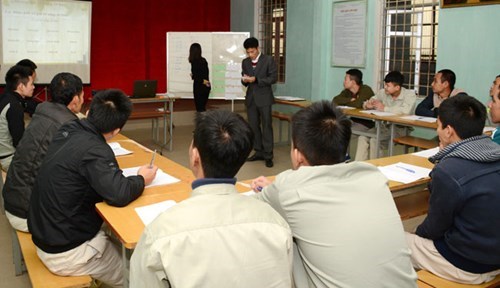Obvious disinformation
The disinformation, published by Human Rights Watch and SBTN.tv, shows that from 2014 to 2016, over 65 thousand drug-users had been sent to or discharged from drug rehab centers in Vietnam. They were arrested by the police and sent to the centers or were sent to the centers by their relatives. Most of them stayed in the centers for one to two years, even four years if they did not achieve good progress in their rehab. At these centers, the drug-users had to undertake some work every day which is considered as therapeutic. Some human rights organizations also accused the centers’ staff of appropriating part of the allowances of the drug-users or embezzling fees paid by families. They also said that some of the drug users were kept there against of their will.
    |
 |
|
Staff of Drug Rehab Facility 7 informing the harmfulness of drugs to drug-users |
Meanwhile, Vu Van Tri, Director of Drug Rehab Facility 7 in Hanoi said that his multi-functional facility’s missions include forced rehab, post-drug rehab management, voluntary drug rehab, methadone treatment, or helping drug-users to reintegrate into the community.
Obviously, the HRW distorted this information and does not show good will towards Vietnam’s humanitarian policies on drug-users or the Government of Vietnam’s investment in upgrading the facilities and improving treatment methods for drug rehab.
Humanitarian policy for people
According to the State’s regulations stated in the document “Protecting and Promoting Human Rights in Vietnam,” published by the Ministry of Foreign Affairs, the rehab process consists of five stages regulated in the Inter-Ministerial Circular 41 of the Ministry of Labor, Invalid, and Social Affairs and the Ministry of Health. Today, drug rehab at drug rehab facilities in Vietnam has voluntary and compulsory forms. For the juvenile, voluntary drug rehab requires approval of their parents or guardians. Meanwhile, compulsory drug rehab is applied for those who depend too much on drugs, experienced rehab at home or within communities, or those who had undergone voluntary rehab treatment but were still dependent.
This is a humanitarian solution that helps drug-users stay away from drug and provides them with living and vocational skills so that they can return to a stabile life in future. This viewpoint is also suitable with one of the effective drug rehab principles highlighted by the National Institute of Drug Abuse under the U.S. Department of Health and Human Services. The United Nations Office on Drugs and Crime and the World Health Organization also agree that drug rehab is not necessarily voluntary to be effective.
To help drug-users find jobs or create jobs by themselves after being discharged from these facilities, the Government issued a decree which regulates responsibilities of these facilities in providing vocational training during rehab process. Vocational training is learning by doing, combined with therapy labor and production for rehabilitation, or making use of available resources at these facilities to make products to serve daily needs of the trainees. It is worth pointing out that this kind of labor is not business. The products that the trainees make help improve the quality of their meals. That means they enjoy what they make themselves.
Furthermore, the drug-users at these facilities enjoy rights and take responsibilities by law such as having convenient accommodation, meeting their relatives, or playing sports... Every behavior that physically or spiritually offends the members is prohibited by law.
Successful treatment
At Methadone treatment section of the Drug Rehab Facility 7 in Xuan Son commune, Son Tay town, Hanoi, Do Van Mai, 50, said that he was carefully instructed by the staff, taking medicine on time, and receiving timely health consultation. “I had been addicted for 20 years. After taking medicine regularly, I don’t need the drug anymore,” he said.
Meanwhile, the drug-users at this facility also have lessons on the harm of the drugs or responsibility with families and communities. In a classroom, equipped with a projector and other teaching aids, teacher Nguyen Dai Yen said that the drug-users there can learn many lessons, ranging from legal education to values in life.
Drug Rehab Facility 7 also has a library and a reading room for the members to learn more during their free time. The members also enjoy sports activities outdoor or in modern multifunctional rooms nearby their accommodation. Vu Van Tri said that healthy group activities help the drug-users feel relaxed, raise their responsibilities, and forget about the drugs.
(to be continued)
Translated by Nam Long